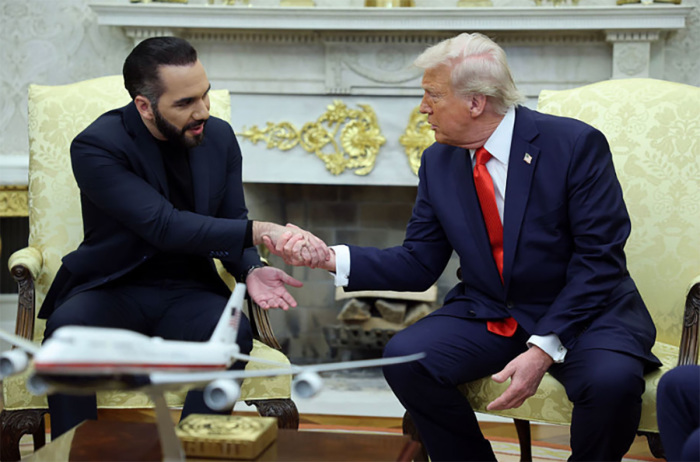‘I’m not going to release him. We don’t like releasing terrorists in our country.’

President Donald Trump welcomed his Salvadoran counterpart, Nayib Bukele, to the White House on Monday for a meeting that strengthened collaboration between the two countries on immigration and security issues.
During the meeting, Trump thanked Bukele for agreeing to the expulsion of migrants accused of terrorism and for allowing the use of a maximum-security prison in El Salvador for their detention, according to Infobae.
Since March, El Salvador has received more than 200 immigrants, mostly Venezuelans, accused by U.S. authorities of belonging to gangs and criminal groups. All were transferred to the Terrorism Confinement Center (CECOT), a mega-prison built by the Bukele government to house members of criminal organizations.
One of the most controversial cases is that of Kilmar Ábrego García, a Salvadoran man who entered the country illegally during the Obama administration. He later married and resided in Prince George’s County, Maryland, with his wife and child, who are U.S. citizens.
In 2019, a judge granted him federal protection from being deported. Last month, however, he was deported under the allegation that he’s an MS-13 gang member.
Ábrego García filed a lawsuit against several federal officials, including Secretary of Homeland Security Kristi Noem and Acting Director of U.S. Immigration and Customs Enforcement Todd Lyons, alleging that he was deprived of due process. Last week, the U.S. Supreme Court said government officials should coordinate his return.
Bukele has refused to return him, arguing that he is a “terrorist” and that his government does not release people it considers dangerous. “I’m not going to release him. We don’t like releasing terrorists in our country,” the Salvadoran president stated.
U.S. Attorney General Pam Bondi, who was present at the meeting, offered a plane to repatriate Ábrego García, but emphasized that El Salvador has custody. Bukele insisted that his country lacks the power to return him and will not allow “a terrorist” to return to the United States. “We have just become the safest country on the continent. We cannot release criminals; that would make us the murder capital of the world again,” he declared.
During the bilateral meeting, Trump publicly praised Bukele’s cooperation, thanking him for helping resolve what he described as the “open borders” problem inherited from previous administrations.
“We had stupid people running this country, and I can say that what they did to us at the border should never and will never be forgotten. What they did was a sin, and you’re helping us. We appreciate it,” Trump said from the Oval Office.
The meeting between Trump and Bukele has drawn criticism from human rights organizations, which question the legality of the deportations and the conditions in which migrants are held at the CECOT (Central Secretariat of the Interior). However, both leaders have defended their collaboration as a necessary measure to combat organized crime and guarantee security in the region.
The alliance between the U.S. and El Salvador on migration and security issues has strengthened in recent months, with the implementation of stricter policies to control immigration and combat transnational gangs. The meeting at the White House marks a new chapter in the bilateral relationship, with a focus on cooperation to address common challenges in the Western Hemisphere.
Bukele’s visit to Washington has also been interpreted as political support for his administration, at a time when his government is facing criticism for the concentration of power and the measures adopted under the state of emergency. However, the understanding between the two leaders reflects a convergence of interests on key issues for the regional agenda.
This article was originally published at CP Español


















